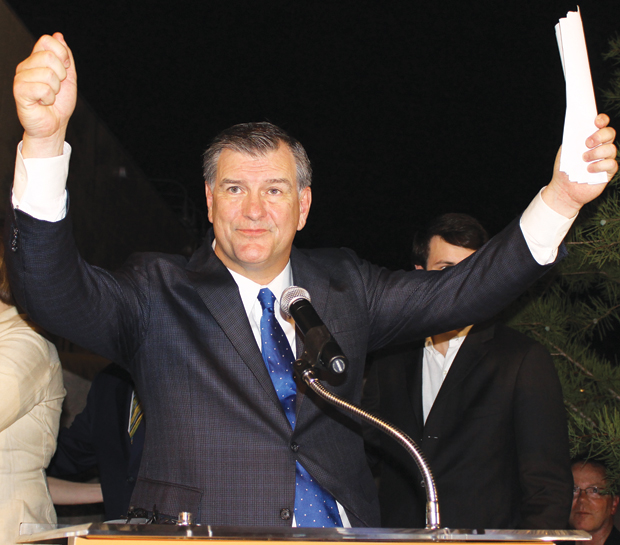
VOTERS LIKED MIKE | Mike Rawlings defeated David Kunkle in a runoff for Dallas mayor in June. (John Wright/Dallas Voice)
No. 2
With former Dallas Mayor Tom Leppert announcing that he was stepping down early to run for the U.S. Senate, and longtime Fort Worth Mayor Mike Moncrief announcing he would not be running for re-election, candidates were lining up early this year for both offices. And the LGBT community on both sides of the Trinity River played a more visible and more vocal role than ever before in city elections.
In Dallas, businessman Mike Rawlings, former Dallas Chief of Police David Kunkle and City Councilman Ron Natinsky, who had reached his term limit representing District 12, quickly emerged as the frontrunners in the mayoral election. All three candidates came courting the LGBT community, participating in the North Texas
GLBT Chamber of Commerce’s mayoral debate and asking for endorsements from individuals in the community, as well as from the Dallas Gay and Lesbian Alliance and Stonewall Democrats of Dallas.
Kunkle’s involvement with the community during his days as police chief helped him win the Stonewall Democrats endorsement in the general election, while Natinsky withdrew his name from contention for the Stonewall endorsement after questions came up over whether his Republican voting record disqualified him.
DGLA threw its weight behind Natinsky, then went a step further to issue a warning against Rawlings, saying that based on his answer to a question during the confidential interview, they feared the candidate’s commitment to business interests might override his commitment to civil rights.
In the general election, Kunkle won in precincts considered to be heavily LGBT and came away with 32 percent of the vote overall to claim a place in the runoff against top-vote-getter Rawlings, who had 41 percent.
The two candidates continued to court the LGBT vote in the runoff, both participating in a second debate on LGBT issues, this one sponsored by Dallas Voice and partner organizations. Although DGLA had shifted its endorsement to Kunkle, Rawlings’ performance in the second debate seemed to win over some LGBT voters, and he won the runoff and the mayor’s seat, with 56 percent of the vote. Kunkle, however, again captured the most heavily LGBT precincts.
DGLA and Stonewall also split their endorsements in the District 14 City Council race, where longtime LGBT ally Angela Hunt faced three opponents, including one-time supporter James Nowlin, a gay man who filed in the race early when Hunt was still considering a run for the mayor’s seat. The race split the community, with Stonewall
Democrats endorsing Nowlin, who was a member of the organization, and DGLA backing Hunt. Hunt went on to win another term of the council without a runoff, taking 65 percent of the vote in the general election. Nowlin was second with 30 percent.
In Fort Worth, former City Councilman Jim Lane, who was on the council when the city became one of the first in the state to include protections for lesbians and gays in its nondiscrimination ordinance, and former Tarrant
County Tax Appraiser/Collector Betsy Price were the top two vote-getters in the general election, and during the runoff campaigns, the two met for the first-ever Fort Worth mayoral debate focusing on LGBT issues.
While Price had raised suspicion among some with a vague answer regarding her position on the city’s recent decision to include protections based on gender identity and gender expression in the nondiscrimination ordinance, both she and Lane pledged at the debate sponsored by the GLBT chamber and Fairness Fort Worth to support LGBT equality and to maintain an open door to the community.
Price went on to win the runoff, 56 percent to 44 percent, and in October became the first Fort Worth mayor to not only ride in, but also serve as grand marshal of, the Tarrant County Gay Pride Parade.
Also in Fort Worth, the city’s first and only openly gay councilmember, Joel Burns, still riding a wave of national popularity following his “It Gets Better” speech during a council meeting the previous October, didn’t even draw an opponent in his bid for a second full term on the council.
Down the road in Arlington, Chris Hightower became the first openly gay candidate to run for city council, tossing his hat into the ring along with three others challenging District 5 incumbent Lana Wolff. Hightower, who easily outpaced all the candidates in fundraising, came out on top of the heap in the general election. But he lost the runoff to Wolff by less than 100 votes, an outcome many of his supporters blamed on anti-gay robocalls describing him as a “weirdo,” a “convicted sex pervert” and a “sex creep” — even though Hightower has no criminal record.
— Tammye Nash
This article appeared in the Dallas Voice print edition December 30, 2011.















